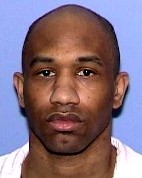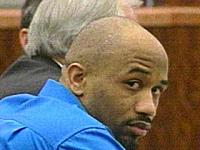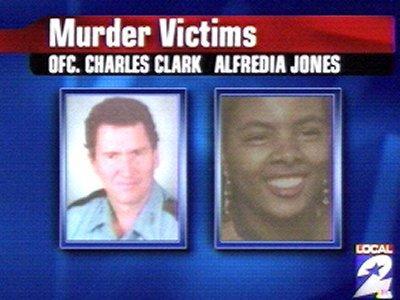In The Court of Criminal Appeals of Texas
AP-75,050
Elijah Dwayne Joubert, Appellant
v.
The State of Texas
ON DIRECT APPEAL FROM
HARRIS COUNTY
CAUSE NO.
944756 IN THE 351ST JUDICIAL DISTRICT COURT
Per curiam.
The appellant was convicted in
October 2004 of capital murder. (1)
Based on the jury's answers to the special issues set forth in
Code of Criminal Procedure Article 37.071, sections 2(b) and 2(e),
the trial judge sentenced the appellant to death.
(2) Direct appeal to this Court is required.
(3) After reviewing the appellant's seven points of
error, we find them to be without merit. Consequently, we affirm
the trial court's judgment and sentence of death.
On April 2, 2003, Dashan Glaspie recruited his
longtime friend, the appellant, and another friend, Alfred Brown,
to help him commit robbery at a check-cashing business. Glaspie
was to act as a lookout while the appellant and Brown went inside.
They drove to the business the next morning. The owner pulled up
as the appellant and Brown were approaching. When the owner saw
them, he pulled out a handgun. The appellant and Brown returned to
the car, and the three decided to abandon the robbery because the
owner had displayed a weapon.
They decided to rob a different business and
drove to a second check cashing location. When Alfredia Jones
arrived to open the store, the appellant approached her at
gunpoint and walked her into the store. Shortly thereafter Glaspie
and Brown entered the store. The appellant allowed Jones to make a
phone call to another store to inform them that she was "opening
Center 24." This was actually a distress code alerting them to the
robbery. The appellant held a gun to Jones's head and told her to
open the safe, while Glaspie began checking the store for
surveillance equipment, and Brown went through Jones's purse.
Police Officer Charles Clark arrived at the scene and entered the
store. The appellant accused Jones of tipping off the police, and
he shot her. The evidence suggested that Brown shot Officer Clark.
Jones and Clark both died as a result of the gunshot wounds.
Pursuant to a thirty-year plea bargain, Glaspie testified for the
State at the appellant's trial.
In point of error four, the appellant claims
Glaspie's testimony, as accomplice-witness testimony, was not
sufficiently corroborated to support the appellant's conviction as
a principal. In his fifth point of error, he contends Glaspie's
testimony was insufficiently corroborated to support his
conviction under a parties theory. (4)
Article 38.14 provides that a conviction cannot
stand on accomplice testimony unless there is other evidence
tending to connect the defendant to the offense. The corroborating
evidence under 38.14 need not be sufficient, standing alone, to
prove beyond a reasonable doubt that a defendant committed the
offense. (5) All that is required
is that there is some non-accomplice evidence tending
to connect the defendant to the offense. Further, there is no
requirement that the non-accomplice testimony corroborate the
accused's connection to the specific element which raises the
offense from murder to capital murder. (6)
There need be only some non-accomplice evidence tending to connect
the defendant to the crime, not to every element of the crime.
(7)
Houston Police Officer James Binford testified
that he interviewed the appellant, who confessed in detail about
his involvement in the instant offense. The interview with Binford
and another officer was videotaped. The videotaped statement was
played for the jury and admitted into evidence. In the video, the
appellant admitted to participating in the instant offense, but he
denied shooting either victim. The videotaped statement was
sufficient to "tend to connect" him to the offense.
(8) The appellant's liability as a principal or under a
parties theory is of no relevance under an Article 38.14 analysis.
The question is whether some evidence "tends to connect" him to
the crime; the connection need not establish the exact nature of
his involvement (as a principal or party). The appellant's
admission that he participated in the crime, although he denied
being a shooter, is enough to tend to connect him to the offense.
Points of error four and five are overruled.
In point of error one, the appellant claims the
trial court erred in overruling his motion to dismiss the
indictment for its alleged failure to include the special
punishment issues, (9) in violation
of his right to due process of law under the Fourteenth Amendment.
The appellant contends that under Apprendi v. New Jersey,
(10) he was entitled to have the grand jury pass on the
special punishment issues before authorizing the State to proceed
on a capital murder prosecution.
Since the Supreme Court decided Apprendi
and its progeny, state courts have struggled with whether
sentencing factors, including the special punishment issues,
should be considered full-blown elements of an offense, requiring
inclusion in an indictment. (11)
Most courts, including this one, have held that the Apprendi
sentencing factors are not elements of offenses for purposes other
than the Sixth Amendment jury-trial guarantee.
(12) We have specifically rejected the argument that
Apprendi requires the State to allege the special issues in
the indictment. (13) Point of
error one is overruled.
We have not examined whether a defendant has a
right to a grand jury indictment on the special punishment issues
under the state constitution. The appellant alleges exactly this
in his second point of error. The appellant claims the trial court
erred in overruling his motion to dismiss the indictment for its
alleged failure to include the special punishment issues, in
violation of his state constitutional right to indictment by grand
jury. He contends the grand jury should be required to pass on the
special issues before the State is authorized to seek the death
penalty. The appellant misquotes King v. State
(14) to support his position, as follows:
At common law all offenses above the grade of
misdemeanor must be prosecuted by indictment, for which it was the
policy of the common law that no man should be put to death
until the necessity therefor should first be determined by a grand
jury. (15)
The appellant emphasizes that this is not a
notice issue; rather, his argument is based on the historic role
of the grand jury to serve as a check on prosecutorial power.
The actual language from King does not
support the appellant's argument. In King, while
discussing the historical basis for indictments at English common
law, the Court quoted from Corpus Juris Secundum ("C.J.S."), where
it is noted that:
At common law all offenses above the grade of
misdemeanor must be prosecuted by indictment, for it was the
policy of the common law that no man should be put on his
trial for felony, for which the punishment was death,
until the necessity therefor should first be determined by a grand
jury on oath. (16)
The appellant has reshaped the meaning of the
reference that indictments were required for all felony cases. The
point being made by the Court about the common law was that
indictments have historically served as protection against
arbitrary accusations by the government in serious criminal cases.
(17) This court has repeatedly recognized prosecutorial
discretion to seek the death penalty, and the C.J.S. excerpt in
King does nothing to change this interpretation of state
law. (18)
Further, there is nothing in the language of
the state constitution itself that requires the grand jury to pass
on special punishment issues. Article I, section 10, pertaining to
the rights of an accused in criminal cases, provides in part that
the accused "shall have the right to demand the nature and cause
of the accusation against him, and to have a copy thereof" and
that "no person shall be held to answer for a criminal offense,
unless on an indictment of a grand jury."
Article V, Section 12(b) defines an indictment:
An indictment is a written instrument presented
to a court by a grand jury charging a person with the commission
of an offense. An information is a written instrument presented to
a court by an attorney for the State charging a person with the
commission of an offense. The practice and procedures relating to
the use of indictments and informations, including their contents,
amendment, sufficiency, and requisites, are as provided by law.
The presentment of an indictment or information to a court invests
the court with jurisdiction of the cause.
Although indictments serve, in part, to "provide
the accused an impartial body which can act as a screen between
the rights of the accused and the prosecuting power of the State,"
(19) this has never been interpreted to mean that the
grand jury screening function provided in the Texas Constitution
pertains to capital sentencing issues.
In Studer v. State,
(20) this Court concluded that, after constitutional
amendments adopted in 1985, the "requisites of an indictment stem
from statutory law alone now." Articles 21.02 and 21.03 set forth
the specific requisites for an indictment, and the Court has held
that these provisions do not require the State to plead the
punishment special issues in a capital case.
(21) Point of error two is overruled.
In his third point of error, the appellant
claims the trial court erred in failing to grant his challenge for
cause against venireperson Patricia Bloom Wohlgemuth. The
appellant contends Wohlgemuth was challengeable for cause because
she would not consider any mitigating evidence during punishment.
The appellant relies on an exchange between defense counsel and
Wohlgemuth in which Wohlugemuth stated that she would not consider
several specific types of evidence named by defense counsel to be
mitigating, including: a difficult childhood, being orphaned at a
young age, drug problems, or poor schooling.
A venireperson is not challengeable for cause
on the ground that she does not consider a particular type of
evidence to be mitigating. (22)
Indeed, a party is not entitled to question a venireperson as to
whether the venireperson could consider particular types of
evidence to be mitigating. (23)
Wohlgemuth stated clearly in other portions of her voir dire that
she was open to considering mitigating evidence and would give the
mitigation issue full and careful consideration. The trial court
did not abuse its discretion in denying the appellant's challenge
for cause against Wohlgemuth. Point of error three is overruled.
In point of error six, the appellant claims the
trial court erred in granting the State's motion to prohibit him
from arguing that co-defendant Glaspie's thirty-year, plea-bargained
sentence was a mitigating factor in assessing his punishment.
Evidence was presented that Glaspie would receive a thirty-year
sentence if he testified truthfully in the appellant's trial.
Before summation at the close of the punishment phase, the court
ruled that the appellant would not be allowed to argue that
Glaspie's sentence was a mitigating circumstance in his case. The
appellant relies on Parker v. Dugger.
(24)
A co-defendant's conviction and punishment have
no bearing on a defendant's own personal moral culpability:
[E]vidence of a co-defendant's conviction and
punishment is not included among the mitigating circumstances
which a defendant has a right to present. In Evans v. State,
656 S.W.2d 65, 67 (Tex.Crim.App.1983), we stated:
"We do not see how the conviction and
punishment of a co-defendant could mitigate appellant's
culpability in the crime. Each defendant should be judged by his
own conduct and participation and by his own circumstances."
(25)
The appellant's reliance on Parker is
misplaced. In Parker, the United States Supreme Court
recognized that evidence of the co-defendants' sentences was part
of the mitigating evidence admitted at Parker's trial. But this
evidence was admissible under Florida law.
(26) The Supreme Court in Parker recognized
that this evidence was presented as mitigating evidence under
Florida law; it did not address whether exclusion of such evidence
would be a violation of federal law or otherwise address any
rationale for inclusion of such evidence under federal law.
(27) This Court has rejected the argument that
Parker compels consideration of punishments received by co-defendants,
concluding that such punishments "relate[] neither to appellant's
character, nor to his record, nor to the circumstances of the
offense." (28) Point of error six
is overruled.
In his seventh point of error, the appellant
claims the trial court erred by instructing the jury that it could
answer special issue two, "Yes," if they found that the appellant
had merely anticipated that a death would occur during the
underlying robbery, in violation of his right against cruel and
unusual punishment. He contends the issue permitted a finding in
favor of the death penalty without a finding that he intended that
a killing occur. He relies on Enmund v. Florida,
(29) and Tison v. Arizona.
(30) This argument has been rejected in other cases,
(31) and we are not persuaded to overrule that precedent.
Point of error seven is overruled.
The judgment of the trial court is affirmed.
Delivered: October 3, 2007.
Publish.
*****
1. Penal Code � 19.03(a).
2. Art. 37.071 � 2(g).
Unless otherwise indicated, all references to Articles refer to
the Code of Criminal Procedure.
3. Art. 37.071 � 2(h).
4. The indictment alleged
the appellant committed capital murder in either of two ways: (1)
by causing the death of Jones during the course of committing a
robbery of Jones; or (2) by causing the deaths of Jones and Clark
during the same criminal transaction. The jury was authorized to
convict the appellant under either paragraph, either as a
principal or under the law of parties.
5. Vasquez v. State,
67 S.W.3d 229, 236 (Tex. Crim. App. 2002).
6. Vasquez v. State,
56 S.W.3d 46, 48 (Tex. Crim. App. 2001).
7. Id.
8. See Jackson
v. State, 516 S.W.2d 167, 171 (Tex. Crim. App. 1974) (stating
that defendant's admission or confession is, under most
circumstances, sufficient to corroborate accomplice testimony).
9. Pursuant to Article
37.071, upon a finding of capital murder, these questions must be
submitted to the jury if the State seeks the death penalty:
(1) whether there is a probability that the
defendant would commit criminal acts of violence that would
constitute a continuing threat to society; and
(2) in cases in which the jury charge at the
guilt or innocence stage permitted the jury to find the defendant
guilty as a party under Sections 7.01 and 7.02, Penal Code,
whether the defendant actually caused the death of the deceased or
did not actually cause the death of the deceased but intended to
kill the deceased or another or anticipated that a human life
would be taken.
(c) The state must prove each issue submitted
under Subsection (b) of this article beyond a reasonable doubt,
and the jury shall return a special verdict of "yes" or "no" on
each issue submitted under Subsection (b) of this Article.
10. 530 U.S. 466 (2000).
11. Kevin R. Reitz,
Symposium: Sentencing: What's at Stake for States? Panel Two:
Considerations at Sentencing- What Factors are Relevant and Who
Should Decide? The New Sentencing Conundrum: Policy and
Constitutional Law at Cross-Purposes, 105 Colum. L. Rev.
1082, 1093, note 42 (2005).
12. Id., at note
42.
13. See Renteria v.
State, 206 S.W.3d 689, 709 (Tex. Crim. App. 2006) (citing
Russeau v. State, 171 S.W.3d 871, 886 (Tex. Crim. App. 2005),
cert. denied, 126S. Ct. 2982 (2006), (Apprendi
and Ring have no applicability to Article 37.071);
Rayford v. State, 125 S.W.3d 521, 533 (Tex. Crim. App.
2003)).
14. 473 S.W.2d 43, 45 (Tex.
Crim. App. 1971).
15. Id. (alteration
in original).
16. Id. (emphasis
added).
17. Id.
18. Cf. Russeau,
171 S.W.3d, at 887 (State's discretion to seek death penalty is
not unconstitutional, citing Hankins v. State, 132 S.W.3d
380, 387 (Tex. Crim. App. 2004), and Ladd v. State, 3 S.W.3d
547, 574 (Tex. Crim. App.1999)).
19. Teal v. State,
230 S.W.3d 172, 175 (Tex. Crim. App. 2007).
20. 799 S.W.2d 263, 272 (Tex.
Crim. App. 1990).
21. Rosales v. State,
748 S.W.2d 451, 458 (Tex. Crim. App. 1987); Sharp v. State,
707 S.W.2d 611, 624 (Tex. Crim. App. 1986).
22. Standefer v. State,
59 S.W.3d 177, 181-82 (Tex. Crim. App. 2001); Rosales v. State,
4 S.W.3d 228, 233 (Tex. Crim. App. 1999); Raby v. State,
970 S.W.2d 1, 3 (Tex. Crim. App. 1998).
23. Rosales, 4 S.W.3d,
at 233.
24. 498 U.S. 308 (1991).
25. Morris v. State,
940 S.W.2d 610, 613 (Tex. Crim. App. 1996).
26. See Boldender v.
Singletary, 16 F.3d 1547, 1566 n.27 (11th Cir. 1994) (noting
that under Florida law, disparate treatment of co-defendants can
constitute non-statutory mitigating circumstance where defendants
are equally culpable).
27. See Morris,
940 S.W.2d at 613 (observing that the Court in Parker did
not address whether evidence of disparate sentencing is mitigating
evidence which must be considered under Lockett v. Ohio,
438 U.S. 586 (1978)); see also State v. Ward, 449 S.E.2d
709, 737 (N.C. 1994)("It did not address . . .or otherwise suggest
that the exclusion of such evidence was improper as a matter of
federal law.").
28. Morris, 940
S.W.2d, at 613.
29. 458 U.S. 782 (1982).
30. 481 U.S. 137 (1987).
31. Ladd, 3 S.W.3d,
at 573; Cantu v. State, 939 S.W.2d 627, 644-45 (Tex. Crim.
App. 1997).



